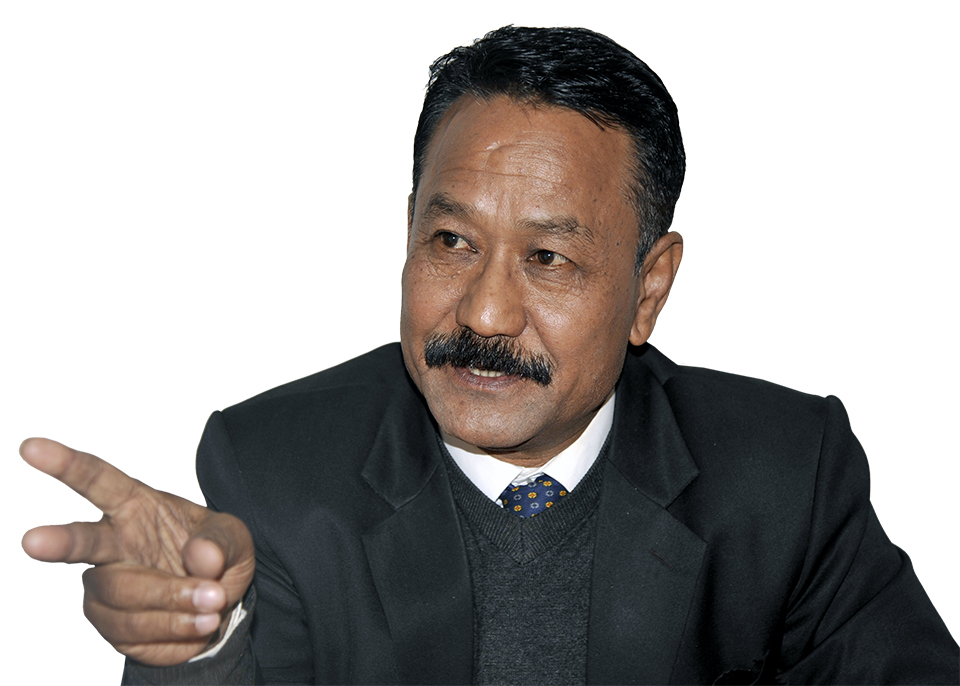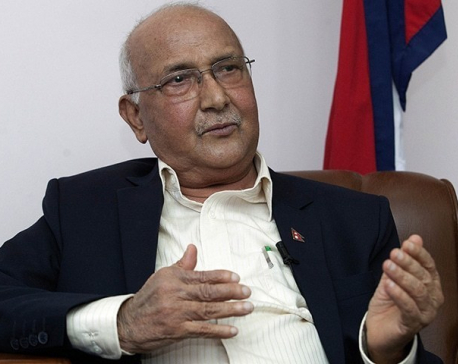
OR
THURSDAY TALK
It will be practically impossible to change provincial boundaries
Published On: December 14, 2017 01:00 AM NPT By: Purna Man Shakya

More from Author
Even as the left alliance is headed for two-thirds majorities in the House of Representatives and nearly all seven provinces, there are concerns and confusions regarding how the central and provincial governments will be formed. What does the constitution say? And how easy or difficult will constitution implementation and amendment processes be from now on? Constitutional expert and veteran lawyer Purna Man Shakya shared his insights with Mahabir Paudyal.
We are in the final stage of vote counting. How will the next government be formed?
The new government will be formed based on the performance of each party that contested these elections. The left alliance has secured a very comfortable majority and is heading towards two-thirds majorities in the federal parliament and in nearly all provinces. With two-third seats in the federal parliament, the left alliance is not only able to form a government but it is also in a position to amend the constitution to its liking. In this sense, the left alliance has become an all-powerful force. No one can challenge its claim to lead the next government. But there are some issues.
What are those issues?
When all the votes are counted, CPN-UML could fall short of a few seats to command a clear majority on its own. The results so far suggest this. In that case, UML alone won’t be able to form the government unless UML and Maoist Center merge to become a single entity and register it in the Election Commission before they start government formation process. If they can do so, we will have a single unified communist party with absolute majorities to form the government. If this does not happen, the new government will be a coalition government. We should not forget that UML and Maoist Center at the moment is only in an alliance. They have not become a single party yet.
Whoever is elected the leader of the coalition government will be called by the existing president to form a government, if these two parties do not merge before they form the government. With these elections, the section dealing with transitional provisions in the constitution is no more applicable. This provision does not guide government formation process. The main provision on government formation will be applied.
What does the main provision say about government formation?
Under this provision, the government formation process is completely different from our past practices. Under the transitional provision, the President would give the parties seven days to form a consensus government. And if they fail to do so within that timeframe the president would write to the Speaker of the parliament to elect as prime minister the person commanding majority support in House of Representatives (which used to be the Constituent Assembly). And until the prime minister aspirant is able to secure majorities in his favor, he would not be appointed the PM. This had led to the situation in which we had rounds and rounds of elections bearing no fruit. We don’t have to go through these lengthy processes now. Now the president calls the party which has the absolute majority to elect their parliamentary party leader, and whoever gets elected from this party, will be called by the president to take oath as the PM. But the person to be elected like this must have the support of more than 50 percent in the parliament.
Election results so far show that no single party will have more than 50 percent seats. In that case, the president will have to call for a coalition government. Then UML and Maoist Center will have to nominate the leader to lead the government. If UML and Maoist party dispute over who should lead the coalition, there can be another alignment because UML will need the support of another party for the majority.
You are saying that formation of a coalition government is no guarantee of stability.
There is a catch. The person sworn in as the prime minister of the coalition government will have to go to the parliament to seek the vote of confidence within 30 days. If he gets confidence vote from the parliament, he will remain the PM for two years because the new constitution does not have a provision to register vote of no confidence against the PM for two years.
There is no guarantee of two years of stability under a coalition government. Many seem to have overlooked an important loophole in our constitution. It is true that a vote of no confidence cannot be registered against the PM for two years. But if one coalition partner withdraws support, the constitution requires the PM to seek vote of confidence from the parliament. If he fails to get the support of more than 50 percent parliamentarians, his government can collapse before two years or even three months after its formation, provided the coalition partner withdraws support. To put it into proper context, had UML secured 50 percent-plus seats in the parliament we would have a stable government for five years or two years at least. But in the present scenario, there is always a risk of government instability. This is why it is absolutely necessary for UML and Maoist Center to merge and become a single political entity before they form the government, if they are really committed to a stable government. Or at least these two parties should remain together.
How will the new President be elected?
The federal parliament and provincial legislatives together will form an electoral college to elect the new president. But before that we also have to form the National Assembly because its members will also be voters in the president’s election. Because all this takes time, perhaps election of the president will also take time. The first priority will be government formation.
Where do we stand in terms of constitution implementation after successful three-tier elections?
With these elections we have only just started the process of constitution implementation. We will have to form governments in provinces as well, for which we need to immediately have governors in all seven provinces. Provisional capitals must also be announced soon. These are the basics. We will need governors to administer oath of office to the ministers in provincial governments. But these are not big issues. Sher Bahadur Deuba’s government can do that. The federal government can later decide whether to continue with these governors or change them. Provincial assemblies will later decide whether to fix the provisional capitals as permanent capitals or change them too.
But as UML and Maoist Center together command two-third majorities and they are going to form the next government, the current caretaker government should consult these two parties before announcing provisional capitals and governors of the provinces. The prime minister should facilitate the process of formation of new government. That is his responsibility.
As the two left parties have together secured almost two-third majority, some argue that it might amend the constitution to cement an authoritarian rule. Do you see that possibility?
If they remain together the leftist parties will be very much able to amend the constitution as they like because they are heading for two-third majorities in the federal parliament and in six provinces. Province 2 is the only exception. They will also most likely have two third majorities in the National Assembly because it will be formed with members nominated by provinces. But amendment will still be tricky because it will have to be endorsed by half of the provinces, at least four provinces, with simple majorities.
Practically and constitutionally that won’t be difficult either but these assemblies cannot go about it the way they like. There are checks. They cannot alter some fundamental things even if they get 100 percent majority. They cannot amend the constitution in a way that affects territorial integrity, unity, independence and national sovereignty. The constitution itself bars amendment on these issues. There are other checks as well.
The Supreme Court by way of interpretation will prohibit amendment on basic provisions of the constitution such as democracy, periodic elections, human rights, freedom of speech and expression, freedom of press, independence of judiciary and fundamental rights. The judiciary might invalidate amendments affecting these core values of the constitution. So even if the provincial assemblies and federal parliament will decide to alter the basic principles of constitution, the judiciary will intervene. Lawyers and civil society members will invoke the jurisdiction of the Supreme Court to check any attempt by the ruling alliance to convert the national charter into a dictatorial one. That won’t be possible.
What about amendments regarding readjustment of provincial boundaries? Madhesi parties say this is their first priority.
Amendment related to boundaries won’t be easy. At least half of the provinces, four in our case, will have to endorse this proposal. And this will have to be endorsed by two-third majorities of both lower and upper houses of federal parliament. Otherwise amendment won’t be successful. However, on restructuring of provinces the affected provinces can exercise veto power. For example, if boundary of Province 2 is altered by consensus of its majority, and if say Province 3 or Province 5, or any province that borders Province 2, does not agree to it, the amendment fails immediately. So it’s tricky. Though the constitution does not say it is impossible to change the boundaries of provinces, practically the current provinces are going to be final. It will be next to impossible to change their boundaries now.
Earlier you said we are at the start of constitution implementation. What challenges do you foresee?
So far so good. But we are still lagging behind in creating basic legislations to make the provincial governments function. Second, the central government needs money to operate provincial governments. The central government will have to share resources with the provincial governments because it will take some time for them to be able to collect revenues through tax regimes or to generate their own resources. Until then, the central government will have to bear the financial responsibilities. That means it will need a lot of money to start with, which will be really challenging.
Third, we are used to the unitary system of government. But from now on, local, provincial and federal governments will operate. Powers of each government have been defined by the constitution. Yet there is the possibility of jurisdictional conflict among three governments over shared or concurrent powers. There may be cases of overlap of jurisdiction. There could be disputes between two provinces, or provinces and local governments or between provincial governments and the central government. In such disputes, the judiciary will have to step in. Whether the judiciary will be able to resolve such disputes will depend on how effectively the constitutional bench created by the Supreme Court to look into those disputes work. So how smooth our constitution implementation process will be will also depend on ability of the central government to manage budget for operation of provincial government, how fairly resources will be shared and how the central government and the Supreme Court will handle jurisdictional disputes.
You May Like This

Change in provincial boundaries not demand of Nepalis: Oli
KATHMANDU, Jan 5: CPN-UML Chair KP Sharma Oli has said the change in the boundaries of the provinces was not... Read More...

Province 3 CM calls for change in work style change for positive results
HETAUDA, Feb 19: Chief Minister of Province 3, Dormani Poudel, has said the change in attitude and work style was... Read More...

Drawing it as it is
I came up with the name Miss Moti because a friend used to call me Moti. I wanted to change... Read More...





Just In
- EC decides to permit public vehicles to operate freely on day of by-election
- Fugitive arrested after 26 years
- Indian Potash Ltd secures contract to bring 30,000 tons of urea within 107 days
- CAN adds four players to squad for T20 series against West Indies 'A'
- ‘Precast' technology introduced in the construction of bridges along Muglin-Pokhara road
- Leopard attack injures young man in Kanchanpur
- SC rejects writ petition filed against Home Minister Lamichhane
- Nepal and China sign two agreements in the presence of Finance Minister Pun















Leave A Comment